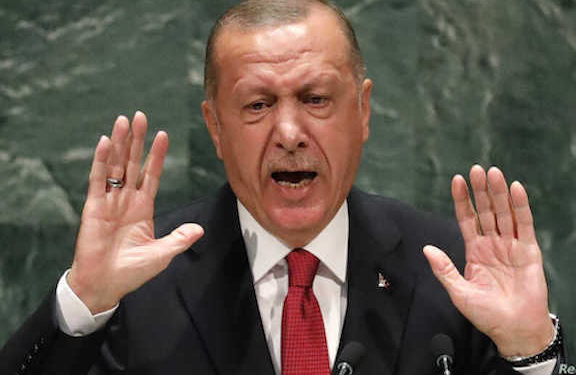Turkey showed no signs of lifting its blockade on Sweden and Finland’s NATO accession in a meeting on Thursday.
A trilateral meeting resulted in no breakthrough for Sweden and Finland to join the defense alliance.
Representatives from the three countries came together for the first time since November as alliance officials sought Turkey’s sign-off.
Sweden cast the meeting as a step forward — regardless of lacking concrete results.
“The most important thing today is that we have gathered,” Sweden’s negotiator Oscar Stenström told reporters at NATO headquarters in Brussels following the talks. The sides, he said, “have agreed to further meetings.”
While 28 out of NATO’s 30 allies were quick to approve Sweden and Finland joining the alliance, the parliaments of Turkey and Hungary have yet to ratify their membership bids.
Ankara, Stockholm and Helsinki signed a memorandum outlining steps the sides would take to address Turkish concerns on arms exports and terrorism at the alliance’s summit in Madrid last summer, when NATO leaders decided to invite Sweden and Finland to join.
But despite policy changes in Finland and Sweden, for example bills designed to prevent participation in terrorist organizations, Ankara has continued to block membership and to raise objections — especially against Sweden.
Tensions deepened in particular after a Danish far-right politician burned a copy of the Quran in Stockholm near the Turkish embassy in January.
And while it is unclear exactly what Turkey seeks with its continued block, there is speculation within the alliance that the drawn-out process is in part due to President Recep Tayyip Erdoğan’s domestic political considerations — as well as an effort to gain leverage in Ankara’s relationship with Washington.
Stenström, the Swedish negotiator, said that Turkey recognizes how Sweden and Finland have “taken concrete steps,” characterizing this as “a good sign.”
Vilnius summit deadline
But lagging approval has fueled frustration across the alliance.
Now, there is growing speculation over whether Finland might end up joining NATO before Sweden.
For NATO allies, a key aim is to get Turkish and Hungarian approval for both countries before the next summit of alliance leaders, scheduled for July in Vilnius.
A delay beyond the annual gathering, officials worry, could be embarrassing for the alliance.
Asked if it is realistic for Sweden to join NATO before the summit, Stenström declined to commit on a timeline.
“My goal as the chief negotiator is as soon as possible, of course; but I cannot promise a date,” he said, adding: “We are focused on the delivery to fulfill the memorandum.”
Helsinki and Stockholm have already received security guarantees from numerous NATO allies, minimizing risks to their security. But a delay would nonetheless complicate the alliance’s planning processes and could impact its political credibility.
There is, however, hope within the alliance that Ankara could sign off after Turkey’s parliamentary and presidential elections — expected in May — but still before the Vilnius summit.
“It is now time for all allies to conclude the ratification process and welcome Finland and Sweden as full members of the alliance ahead of the upcoming NATO summit in Vilnius,” NATO Secretary-General Jens Stoltenberg said on Thursday.
In a statement after the session, the NATO chief said that the sides “agreed that rapid ratifications for both Finland and Sweden would be in everyone’s interest” and “agreed to continue cooperation in this format and meet again before the Vilnius summit.”
Sweden’s leadership, meanwhile, has taken an optimistic tone on its prospects.
“We have fulfilled all of what we said that we were going to do,” Swedish Foreign Minister Tobias Billström told POLITICO on Thursday, pointing to a new anti-terror bill.
The minister emphasized how Stockholm and Helsinki would contribute to the alliance.
“We bring well-equipped and well-trained forces into NATO, and we will be adding to the security — and to the security of northern Europe — in a way which is unprecedented,” he said.
“It wasn’t an easy decision for Sweden to give up 200 years of being a non-military aligned state. The brutality of Russia’s onslaught in Ukraine was the reason why we did so,” he said.
“I think,” he concluded, “we have grounds for being hopeful.”













